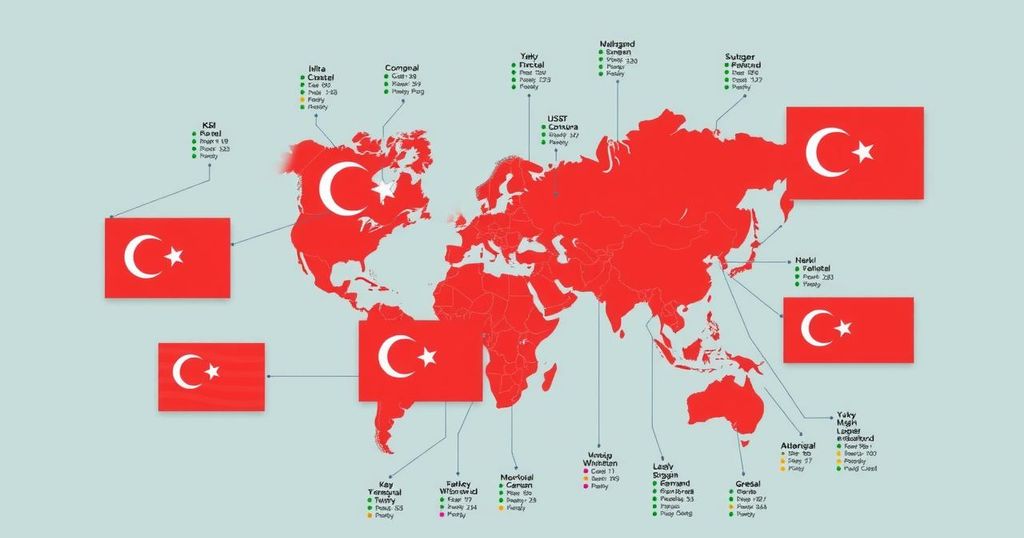Turkey’s Ankara Process: A Diplomatic Achievement for Peace and Stability in Africa

Turkey’s Ankara Process successfully mediated tensions between Somalia and Ethiopia, averting conflict and promoting regional stability. Led by President Erdoğan and Foreign Minister Hakan Fidan, the initiative emphasized international law and cooperation, reinforcing Somalia’s sovereignty while addressing Ethiopia’s economic access to the Red Sea. This diplomatic success has enhanced Turkey’s influence in Africa and showcases its role as a reliable mediator for peace and development.
Turkey has successfully cemented its win-win policy in Africa with the completion of the Ankara Process, a diplomatic initiative aimed at fostering peace, security, and development on the continent. Notably, Turkey played a vital role in preventing the rising tensions between Somalia and Ethiopia from escalating into a regional conflict, thereby stabilizing the Horn of Africa. The conflict, which began on January 1, 2024, with the signing of a controversial memorandum by Ethiopian Prime Minister Abiy Ahmed Ali, posed severe risks to Somalia’s sovereignty. Dialogue facilitated by Turkey emerged as crucial in averting what could have transformed into a widespread armed confrontation.
Between January and July 2024, dialogue seemed dormant, with tensions escalating from Ethiopia’s actions. However, Turkey’s intervention restored communication between the parties, underscoring the nation’s commitment to the principle of “Peace at Home, Peace in the World.” Under President Recep Tayyip Erdoğan’s leadership, Turkey’s engagement established a foundation for dialogue, which ultimately culminated in the Ankara Declaration, emphasizing respect for Somalia’s territorial integrity and international law.
The Ankara Declaration, shaped by Turkey’s Foreign Minister Hakan Fidan and his adept team, resulted in a significant diplomatic breakthrough that not only averted regional conflict but also reinforced the legitimacy of the Somali Federal Government internationally. The agreement acknowledged Ethiopia’s economic needs while safeguarding Somalia’s sovereignty, thus providing a framework for cooperation without jeopardizing stability.
Critically, Turkey’s role in managing this delicate situation has not gone unnoticed, receiving commendation from several sectors, even those initially skeptical of its involvement in Africa. The successful mediation contributed to counteracting threats such as Daesh and al-Shabab in the region, further integrating Turkey’s diplomatic efforts into global counterterrorism initiatives. Moreover, the peaceful resolution through the Ankara Process effectively opened avenues for economic collaboration that would benefit both nations.
The outcomes of the Ankara Process have reshaped regional power dynamics and underscored Turkey’s position as a reliable mediator and partner in Africa. The process has attracted global attention, especially from European nations observing Turkey’s increasingly influential role. France, for example, seeks to re-establish its diplomatic presence in East Africa, indicating potential new contests for influence in the region.
Turkey’s initiatives in Africa are perceived as positive and constructive, fostering a sense of regional unity and collaboration. The cordial relationships Turkey has built with various nations position it as a vital player in ensuring peace and stability not only in the Horn of Africa but across the continent. In light of Turkey’s growing influence, there remains potential for further diplomatic endeavors, such as mediating peace talks involving Sudan and the United Arab Emirates, which could solidify the Ankara Process’s legacy as a cornerstone of diplomatic success in the region.
The Ankara Process is a diplomatic initiative led by Turkey focused on resolving conflicts and fostering cooperation in the Horn of Africa, particularly between Ethiopia and Somalia. Tensions escalated significantly with Ethiopia’s MoU with Somaliland, posing a threat to regional stability. Turkey’s intervention highlighted its strategic approach to foreign policy, promoting a ‘win-win’ relationship that prioritizes regional interests while managing security concerns. This method aligns with Turkey’s overarching goal of enhancing its role as a key mediator in African affairs, balancing geopolitics amidst competing international interests.
In summary, Turkey’s successful implementation of the Ankara Process has played a pivotal role in securing peace between Somalia and Ethiopia while reinforcing its influence in Africa. This process not only contributed to regional stability but also solidified Turkey’s position as a trusted mediator in global diplomacy. The emphasis on international law and cooperation signifies a shift towards collaborative relations in Africa, with Turkey leading the way in pioneering sustainable development initiatives. Ultimately, the Ankara Declaration sets a precedent for future diplomatic engagements, fostering long-term peace transcending beyond immediate economic interests.
Original Source: www.dailysabah.com








